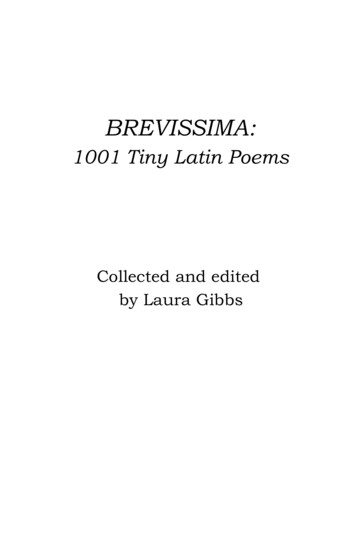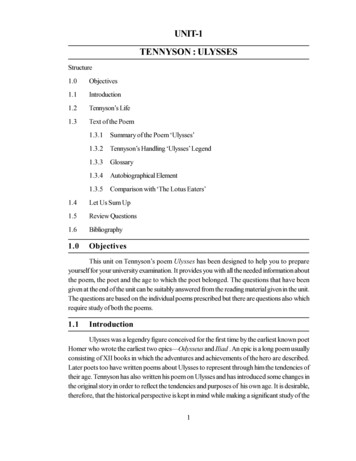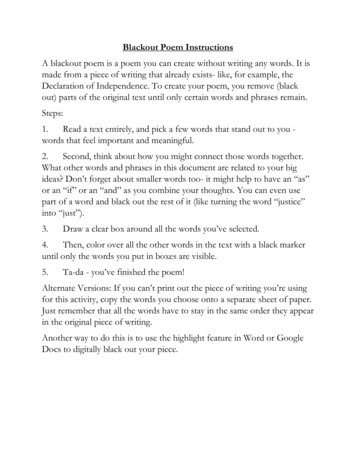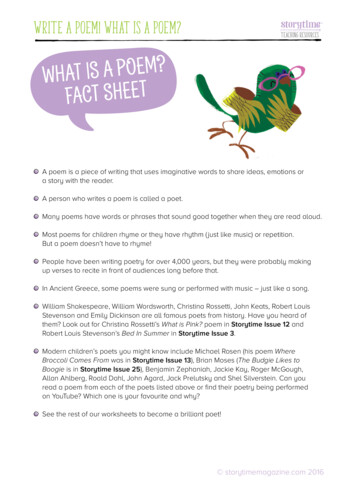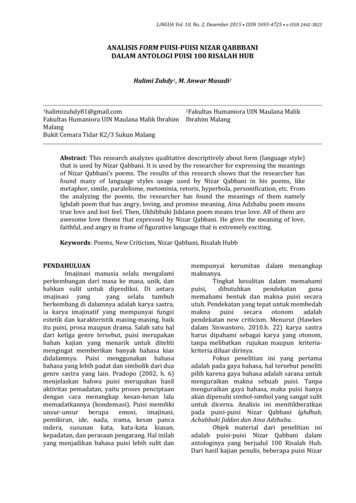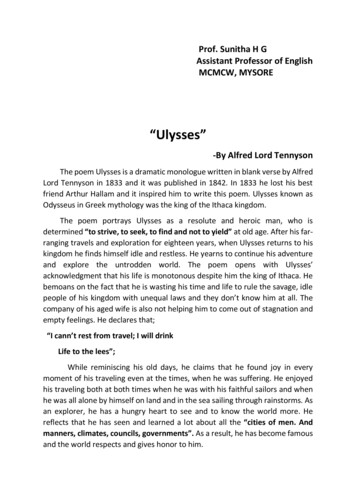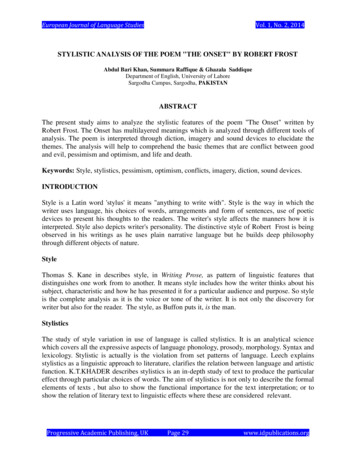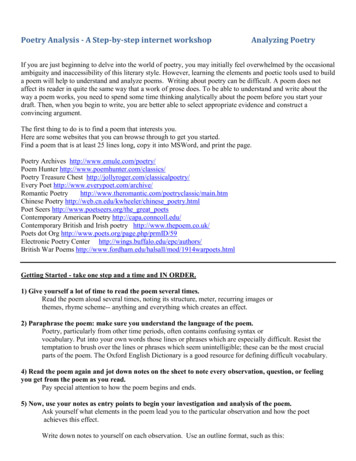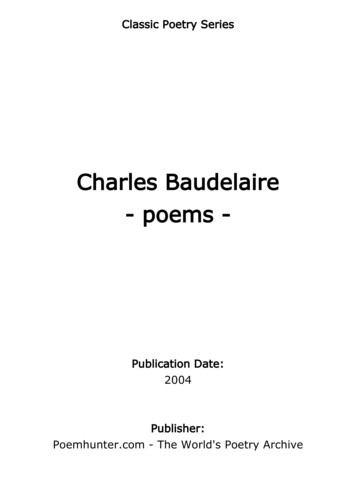
Transcription
Classic Poetry SeriesCharles Baudelaire- poems -Publication Date:2004Publisher:Poemhunter.com - The World's Poetry Archive
Charles Baudelaire(9 April 1821 – 31 August 1867)Charles Pierre Baudelaire was a French poet who produced notable work as anessayist, art critic, and pioneering translator of a href " b Baudelaire the poet /b “ i Who among us has not dreamt, in moments of ambition, of the miracle of apoetic prose, musical without rhythm and rhyme, supple and staccato enough toadapt to the lyrical stirrings of the soul, the undulations of dreams, and suddenleaps of consciousness. This obsessive idea is above all a child of giant cities, ofthe intersecting of their myriad relations. /i ”Baudelaire is one of the major innovators in French literature. His poetry isinfluenced by the French romantic poets of the earlier 19th century, although itsattention to the formal features of verse connect it more closely to the work ofthe contemporary 'Parnassians'. As for theme and tone, in his works we see therejection of the belief in the supremacy of nature and the fundamental goodnessof man as typically espoused by the romantics and expressed by them inrhetorical, effusive and public voice in favor of a new urban sensibility, anawareness of individual moral complexity, an interest in vice (linked withdecadence) and refined sensual and aesthetical pleasures, and the use of urbansubject matter, such as the city, the crowd, individual passers-by, all expressedin highly ordered verse, sometimes through a cynical and ironic voice. Formally,the use of sound to create atmosphere, and of 'symbols', (images which take onan expanded function within the poem), betray a move towards considering thepoem as a self-referential object, an idea further developed by the SymbolistsVerlaine and Mallarmé, who acknowledge Baudelaire as a pioneer in this regard.Beyond his innovations in versification and the theories of symbolism and'correspondences', an awareness of which is essential to any appreciation of theliterary value of his work, aspects of his work which regularly receive (or havereceived) much critical discussion include the role of women, the theologicaldirection of his work and his alleged advocacy of 'satanism', his experience ofdrug-induced states of mind, the figure of the dandy, his stance regardingdemocracy and its implications for the individual, his response to the spiritualuncertainties of the time, his criticisms of the bourgeois, and his advocacy ofmodern music and painting (e.g., Wagner, Delacroix). b Early life /b www.PoemHunter.com - The World's Poetry Archive1
Baudelaire was born in Paris, France on April 9, 1821 and baptized two monthslater at Saint-Sulpice Roman Catholic Church. His father, François Baudelaire, asenior civil servant and amateur artist, was thirty-four years older thanBaudelaire's mother. François died during Baudelaire's childhood, in 1827. Thefollowing year, Caroline married Lieutenant Colonel Jacques Aupick, who laterbecame a French ambassador to various noble courts. Biographers have oftenseen this as a crucial moment, considering that finding himself no longer the solefocus of his mother's affection left him with a trauma which goes some way toexplaining the excesses later apparent in his life. He stated in a letter to her that,"There was in my childhood a period of passionate love for you". Baudelaireregularly implored his mother for money throughout his career, often promisingthat a lucrative publishing contract or journalistic commission was just aroundthe corner.Baudelaire was educated in Lyon, where he boarded. Baudelaire at fourteen wasdescribed by a classmate: "He was much more refined and distinguished thanany of our fellow pupils [.] we are bound to one another[.] by shared tastesand sympathies, the precocious love of fine works of literature". Baudelaire waserratic in his studies, at times diligent, at other times prone to "idleness". Later,he attended the Lycée Louis-le-Grand in Paris, studying law, a popular course forthose not yet decided on any particular career. Baudelaire began to frequentprostitutes and may have contracted gonorrhea and syphilis during this period.Baudelaire began to run up debts, mostly for clothes. Upon gaining his degree in1839, he told his brother "I don't feel I have a vocation for anything." Hisstepfather had in mind a career in law or diplomacy, but instead Baudelairedecided to embark upon a literary career. His mother later recalled: "Oh, whatgrief! If Charles had let himself be guided by his stepfather, his career wouldhave been very different. He would not have left a name in literature, it is true,but we should have been happier, all three of us".His stepfather sent him on a voyage to Calcutta, India in 1841 in the hope ofending his dissolute habits. The trip provided strong impressions of the sea,sailing, and exotic ports, that he later employed in his poetry. (Baudelaire laterexaggerated his aborted trip to create a legend about his youthful travels andexperiences, including "riding on elephants".) Baudelaire returned to the tavernswhere he began to compose some of the poems of Les Fleurs du Mal. At twentyone, he received a good-sized inheritance but squandered much of it within a fewyears. His family obtained a decree to place his property in trust which heresented bitterly, at one point arguing that allowing him to fail alone financiallywould have been the one sure way of teaching him the value of maintaining wellordered finances.www.PoemHunter.com - The World's Poetry Archive2
Baudelaire became known in artistic circles as a dandy and free-spender. Duringthis time Jeanne Duval became his mistress. His mother thought Duval a "BlackVenus" who "tortured him in every way" and drained him of money at everyopportunity. She was rejected by his family. He made a suicide attempt duringthis time.Baudelaire took part in the Revolutions of 1848 and wrote for a revolutionarynewspaper. However, his interest was passing, as he was later to note in hispolitical writings in his journals.In the early 1850s, Baudelaire struggled with poor health, pressing debts, andirregular literary output. He often moved from one lodging to another to escapecreditors. He received many projects that he was unable to complete, though hedid finish translations of stories by Edgar Allan Poe.Upon the death of his stepfather in 1857, Baudelaire received no mention in thewill but he was heartened nonetheless that the division with his mother mightnow be mended. At thirty-six he wrote her: "believe that I belong to youabsolutely, and that I belong only to you". b Published career /b His first published work was his art review "Salon of 1845," which attractedimmediate attention for its boldness. Many of his critical opinions were novel intheir time, including his championing of Delacroix, and some of his views seemremarkably in tune with the future theories of the Impressionist painters.In 1846, Baudelaire wrote his second Salon review, gaining additional credibilityas an advocate and critic of Romanticism. His support of Delacroix as theforemost Romantic artist gained widespread following year Baudelaire's novellaLa Fanfarlo was published. b The Flowers of Evil /b Baudelaire was a slow and fastidious worker, often sidetracked by indolence,emotional distress and illness, and it was not until 1857 that he published hisfirst and most famous volume of poems, Les Fleurs du mal (The Flowers of Evil).Some of these poems had already appeared in the Revue des deux mondes(Review of Two Worlds), when they were published by Baudelaire's friendAuguste Poulet Malassis.The poems found a small, appreciative audience, but greater public attention waswww.PoemHunter.com - The World's Poetry Archive3
given to their subject matter. The effect on fellow artists was, as Théodore deBanville stated, "immense, prodigious, unexpected, mingled with admiration andwith some indefinable anxious fear". Flaubert, recently attacked in a similarfashion for Madame Bovary (and acquitted), was impressed and wrote toBaudelaire: "You have found a way to rejuvenate Romanticism. You are asunyielding as marble, and as penetrating as an English mist".The principal themes of sex and death were considered scandalous. He alsotouched on lesbianism, sacred and profane love, metamorphosis, melancholy, thecorruption of the city, lost innocence, the oppressiveness of living, and wine.Notable in some poems is Baudelaire's use of imagery of the sense of smell andof fragrances, which is used to evoke feelings of nostalgia and past intimacy.The book, however, quickly became a byword for unwholesomeness amongmainstream critics of the day. Some critics called a few of the poems"masterpieces of passion, art and poetry" but other poems were deemed to meritno less than legal action to suppress them. J. Habas writing in Le Figaro, led thecharge against Baudelaire, writing: "Everything in it which is not hideous isincomprehensible, everything one understands is putrid". Then Baudelaireresponded to the outcry, in a prophetic letter to his mother: i "You know that I have always considered that literature and the arts pursuean aim independent of morality. Beauty of conception and style is enough for me.But this book, whose title (Fleurs du mal) says everything, is clad, as you willsee, in a cold and sinister beauty. It was created with rage and patience.Besides, the proof of its positive worth is in all the ill that they speak of it. Thebook enrages people. Moreover, since I was terrified myself of the horror that Ishould inspire, I cut out a third from the proofs. They deny me everything, thespirit of invention and even the knowledge of the French language. I don't care arap about all these imbeciles, and I know that this book, with its virtues and itsfaults, will make its way in the memory of the lettered public, beside the bestpoems of a href "Baudelaire, his publisher and the printer were successfully prosecuted forcreating an offense against public morals. They were fined but Baudelaire wasnot imprisoned. Six of the poems were suppressed, but printed later as LesÉpaves (The Wrecks) (Brussels, 1866). Another edition of Les Fleurs du mal,without these poems, but with considerable additions, appeared in 1861. Manynotables rallied behind Baudelaire and condemned the sentence. Victor Hugowrote to him: "Your fleurs du mal shine and dazzle like stars. I applaud yourvigorous spirit with all my might". Baudelaire did not appeal the judgment buthis fine was reduced. Nearly 100 years later, on May 11, 1949, Baudelaire waswww.PoemHunter.com - The World's Poetry Archive4
vindicated, the judgment officially reversed, and the six banned poems reinstatedin France.[In the poem "Au lecteur" ("To the Reader") that prefaces Les Fleurs du mal,Baudelaire accuses his readers of hypocrisy and of being as guilty of sins and liesas the poet: i .If rape or arson, poison or the knifeHas wove no pleasing patterns in the stuffOf this drab canvas we accept as life—It is because we are not bold enough! /i b Final years /b Baudelaire next worked on a translation and adaptation of Thomas de Quincey'sConfessions of an English Opium Eater. Other works in the years that followedincluded Petits Poèmes en prose (Small Prose poems); a series of art reviewspublished in the Pays, Exposition universelle (Country, World Fair); studies onGustave Flaubert (in L'Artiste, October 18, 1857); on Théophile Gautier (Revuecontemporaine, September 1858); various articles contributed to EugeneCrepet's Poètes francais; Les Paradis artificiels: opium et haschisch (Frenchpoets; Artificial Paradises: opium and hashish) (1860); and Un Dernier Chapitrede l'histoire des oeuvres de Balzac (A Final Chapter of the history of works ofBalzac) (1880), originally an article "Comment on paye ses dettes quand on a dugénie" ("How one pays one's debts when one has genius"), in which his criticismturns against his friends Honoré de Balzac, Théophile Gautier, and Gérard deNerval.By 1859, his illnesses, his long-term use of laudanum, his life of stress andpoverty had taken a toll and Baudelaire had aged noticeably. But at last, hismother relented and agreed to let him live with her for a while at Honfleur.Baudelaire was productive and at peace in the seaside town, his poem Le Voyagebeing one example of his efforts during that time. In 1860, he became an ardentsupporter of Richard Wagner.His financial difficulties increased again, however, particularly after his publisherPoulet Malassis went bankrupt in 1861. In 1864, he left Paris for Belgium, partlyin the hope of selling the rights to his works and also to give lectures. His longstanding relationship with Jeanne Duval continued on-and-off, and he helped herto the end of his life. Baudelaire's relationships with actress Marie Daubrun andwith courtesan Apollonie Sabatier, though the source of much inspiration, neverproduced any lasting satisfaction. He smoked opium, and in Brussels he began towww.PoemHunter.com - The World's Poetry Archive5
drink to excess. Baudelaire suffered a massive stroke in 1866 and paralysisfollowed. After more than a year of aphasia, he received the last rites of theCatholic Church. The last two years of his life were spent, in a semi-paralyzedstate, in "maisons de santé" in Brussels and in Paris, where he died on August31, 1867. Baudelaire is buried in the Cimetière du Montparnasse, Paris.Many of Baudelaire's works were published posthumously. After his death, hismother paid off his substantial debts, and at last she found some comfort inBaudelaire's emerging fame. "I see that my son, for all his faults, has his place inliterature". She lived another four years. b Critiques /b Baudelaire was an active participant in the artistic life of his times. As critic andessayist, he wrote extensively and perceptively about the luminaries and themesof French culture. He was frank with friends and enemies, rarely took thediplomatic approach and sometimes responded violently verbally, which oftenundermined his cause. His associations were numerous and included: GustaveCourbet, Honoré Daumier, Franz Liszt, Champfleury, Victor Hugo, GustaveFlaubert, Balzac and the artists and writers that follow. b Edgar Allan Poe /b In 1846 and 1847, Baudelaire became acquainted with the works of Poe, in whichhe found tales and poems that had, he claimed, long existed in his own brain butnever taken shape. Baudelaire had much in common with Poe (who died in 1849at age forty). The two poets display a similar sensibility of the macabre andsupernatural turn of mind; each struggled with illness, poverty, and melancholy.Like Poe, Baudelaire believed in the doctrine of original sin, denounceddemocracy and the idea of progress and of man's natural goodness, and Poe helda disdainful aristocratic attitude similar to Baudelaire's dandy. Baudelaire saw inPoe a precursor and tried to be his French contemporary counterpart. From thistime until 1865, he was largely occupied with translating Poe's works; histranslations were widely praised. Baudelaire was not the first French translator ofPoe, but his "scrupulous translations" were considered among the best. Thesewere published as Histoires extraordinaires (Extraordinary stories) (1852),Nouvelles histoires extraordinaires (New extraordinary stories) (1857), Aventuresd'Arthur Gordon Pym, Eureka, and Histoires grotesques et sérieuses (Grotesqueand serious stories) (1865). Two essays on Poe are to be found in his Oeuvrescomplètes (Complete works) (vols. v. and vi.). b Eugène Delacroix /b www.PoemHunter.com - The World's Poetry Archive6
A strong supporter of the Romantic painter Delacroix, Baudelaire called him "apoet in painting." Baudelaire also absorbed much of Delacroix's aesthetic ideas asexpressed in his journals. As Baudelaire elaborated in his "Salon of 1846", "Asone contemplates his series of pictures, one seems to be attending thecelebration of some grievous mystery. This grave and lofty melancholy shineswith a dull light. plaintive and profound like a melody by Weber". Delacroix,though appreciative, kept his distance from Baudelaire, particularly after thescandal of Les Fleurs du mal. In private correspondence, Delacroix stated thatBaudelaire "really gets on my nerves" and he expressed his unhappiness withBaudelaire's persistent comments about "melancholy" and "feverishness". b Richard Wagner /b Baudelaire had no formal musical training, and knew little of composers beyondBeethoven and Carl Maria von Weber. Weber was in some ways Wagner'sprecursor, using the leitmotif and conceiving the idea of the "total art work"("Gesamtkunstwerk"), both of which found Baudelaire's admiration. Before evenhearing Wagner's music, Baudelaire studied reviews and essays about him, andformulated his impressions. Later, Baudelaire put them into his non-technicalanalysis of Wagner, which was highly regarded, particularly his essay "RichardWagner et Tannhäuser à Paris". Baudelaire's reaction to music was passionateand psychological. "Music engulfs (possesses) me like the sea". After attendingthree Wagner concerts in Paris in 1860, Baudelaire wrote to the composer: "I hada feeling of pride and joy in understanding, in being possessed, in beingoverwhelmed, a truly sensual pleasure like that of rising in the air". Baudelaire'swritings contributed to the elevation of Wagner and to the cult of Wagnerism thatswept Europe in the following decades. b Théophile Gautier /b Gautier, writer and poet, earned Baudelaire's respect for his perfection of formand his mastery of language, though Baudelaire thought he lacked deeperemotion and spirituality. Both strove to express the artist's inner vision, whichHeinrich Heine had earlier stated: "In artistic matters, I am a supernaturalist. Ibelieve that the artist can not find all his forms in nature, but that the mostremarkable are revealed to him in his soul". Gautier's frequent meditations ondeath and the horror of life are themes which influenced Baudelaire writings. Ingratitude for their friendship and commonality of vision, Baudelaire dedicated LesFleurs du mal to Gautier. b Édouard Manet /b www.PoemHunter.com - The World's Poetry Archive7
Manet and Baudelaire became constant companions from around 1855. In theearly 1860s, Baudelaire accompanied Manet on daily sketching trips and oftenmet him socially. Manet also lent Baudelaire money and looked after his affairs,particularly when Baudelaire went to Belgium. Baudelaire encouraged Manet tostrike his own path and not succumb to criticism. "Manet has great talent, atalent which will stand the test of time. But he has a weak character. He seemsto me crushed and stunned by shock". In his painting Music in the Tuileries,Manet includes portraits of his friends Théophile Gautier, Jacques Offenbach, andBaudelaire. While it's difficult to differentiate who influenced whom, both Manetand Baudelaire discussed and expressed some common themes through theirrespective arts. Baudelaire praised the modernity of Manet's subject matter:"almost all our originality comes from the stamp that 'time' imprints upon ourfeelings". When Manet's famous Olympia (1865), a portrait of a nude prostitute,provoked a scandal for its blatant realism mixed with an imitation of Renaissancemotifs, Baudelaire worked privately to support his friend, though he offered nopublic defense (he was, however, ill at the time). When Baudelaire returned fromBelgium after his stroke, Manet and his wife were frequent visitors at the nursinghome and she would play passages from Wagner for Baudelaire on the piano. b Nadar /b Nadar (Félix Tournachon) was a noted caricaturist, scientist and important earlyphotographer. Baudelaire admired Nadar, one of his closest friends, and wrote:"Nadar is the most amazing manifestation of vitality". They moved in similarcircles and Baudelaire made many social connections through him. Nadar's exmistress Jeanne Duval became Baudelaire's mistress around 1842. Baudelairebecame interested in photography in the 1850s and denounced it as an art formand advocated for its return to "its real purpose, which is that of being theservant to the sciences and arts". Photography should not, according toBaudelaire, encroach upon "the domain of the impalpable and the imaginary".Nadar remained a stalwart friend right to Baudelaire's last days and wrote hisobituary notice in Le Figaro. b Philosophy /b Many of Baudelaire's philosophical proclamations were considered scandalousand intentionally provocative in his time. He wrote on a wide range of subjects,drawing criticism and outrage from many quarters. b Love /b www.PoemHunter.com - The World's Poetry Archive8
i "There is an invincible taste for prostitution in the heart of man, from whichcomes his horror of solitude. He wants to be 'two'. The man of genius wants tobe 'one'. It is this horror of solitude, the need to lose oneself in the externalflesh, that man nobly calls 'the need to love'." /i b Marriage /b i "Unable to suppress love, the Church wanted at least to disinfect it, and itcreated marriage." /i b The artist /b i "The more a man cultivates the arts, the less randy he becomes. Only thebrute is good at coupling, and copulation is the lyricism of the masses. Tocopulate is to enter into another–and the artist never emerges fromhimself." /i i "Style is character" /i b Pleasure /b i "Personally, I think that the unique and supreme delight lies in the certaintyof doing 'evil'–and men and women know from birth that all pleasure lies inevil." /i b Politics /b Along with Poe, Baudelaire named the arch-reactionary Joseph de Maistre as hismaître à penser and adopted increasingly aristocratic views. In his journals, hewrote i "There is no form of rational and assured government save anaristocracy. A monarchy or a republic, based upon democracy, are equally absurdand feeble. The immense nausea of advertisements. There are but three beingsworthy of respect: the priest, the warrior and the poet. To know, to kill and tocreate. The rest of mankind may be taxed and drudged, they are born for thestable, that is to say, to practise what they call professions." /i b Influence /b Baudelaire's influence on the direction of modern French (and English) languageliterature was considerable. The most significant French writers to come afterhim were generous with tributes; four years after his death, Arthur Rimbaudpraised him in a letter as 'the king of poets, a true God'. In 1895, Stéphanewww.PoemHunter.com - The World's Poetry Archive9
Mallarmé published a sonnet in Baudelaire's memory, 'Le Tombeau de CharlesBaudelaire'. Marcel Proust, in an essay published in 1922, stated that along with a href "In the English-speaking world, Edmund Wilson credited Baudelaire as providingan initial impetus for the Symbolist movement, by virtue of his translations ofPoe. In 1930, a href "At the same time that Eliot was affirming Baudelaire's importance from a broadlyconservative and explicitly Christian viewpoint, left-wing critics such as Wilsonand Walter Benjamin were able to do so from a dramatically differentperspective. Benjamin translated Baudelaire's Tableaux Parisiens into Germanand published a major essay on translation as the foreword.In the late 1930s, Benjamin used Baudelaire as a starting point and focus for hismonumental attempt at a materialist assessment of 19th century culture, DasPassagenwerk. For Benjamin, Baudelaire's importance lay in his anatomies of thecrowd, of the city and of modernity.In 1982, avant-garde performance artist and vocalist Diamanda Galás recordedan adaptation of his poem The Litanies of Satan (Les Litanies de Satan).The Baudelaires, protagonists of Lemony Snicket's A Series of UnfortunateEvents, were named after him.Currently, Vanderbilt University has "assembled one of the world’s mostcomprehensive research collections on.Baudelaire."www.PoemHunter.com - The World's Poetry Archive10
À Une Dame Créole (To A Creole Lady)Au pays parfumé que le soleil caresse,J'ai connu, sous un dais d'arbres tout empourprésEt de palmiers d'où pleut sur les yeux la paresse,Une dame créole aux charmes ignorés.Son teint est pâle et chaud; la brune enchanteresseA dans le cou des airs noblement maniérés;Grande et svelte en marchant comme une chasseresse,Son sourire est tranquille et ses yeux assurés.Si vous alliez, Madame, au vrai pays de gloire,Sur les bords de la Seine ou de la verte Loire,Belle digne d'orner les antiques manoirs,Vous feriez, à l'abri des ombreuses retraitesGermer mille sonnets dans le coeur des poètes,Que vos grands yeux rendraient plus soumis que vos --------------------------------------To a Creole LadyIn the perfumed country which the sun caresses,I knew, under a canopy of crimson treesAnd palms from which indolence rains into your eyes,A Creole lady whose charms were unknown.Her complexion is pale and warm; the dark enchantressAffects a noble air with the movements of her neck.Tall and slender, she walks like a huntress;Her smile is calm and her eye confident.If you went, Madame, to the true land of glory,On the banks of the Seine or along the green Loire,Beauty fit to ornament those ancient manors,You'd make, in the shelter of those shady retreats,A thousand sonnets grow in the hearts of poets,Whom your large eyes would make more subject than your slaves.www.PoemHunter.com - The World's Poetry Archive11
Translated by William --------------------------------------To a Colonial LadyIn scented countries by the sun caressedI've known, beneath a tent of purple boughs,And palmtrees shedding slumber as they drowse,A creole lady with a charm unguessed.She's pale, and warm, and duskily beguiling;Nobility is moulded in her neck;Slender and tall she holds herself in check,An huntress born, sure-eyed, and quiet-smiling.Should you go, Madam, to the land of gloryAlong the Seine or Loire, where you would meritTo ornament some mansion famed in story,Your eyes would bum in those deep-shaded parts,And breed a thousand rhymes in poets' hearts,Tamed like the negro slaves that you inherit.Translated by Roy --------------------------------------To a Creole LadyIn that perfumed country caressed by the sun,I have known, under a canopy of purple treesAnd palms raining idleness upon the eyes,A creole lady of private beauty.Her shade is pale and warm; this brown enchantressHas gracefully mannered airs in her neck;Large and sinuous, walking like a huntress,Her smile is silent and her eyes secure.If you should go, Madam, to the true country of glory,www.PoemHunter.com - The World's Poetry Archive12
On the banks of the Seine or of the green Loire,Fair lady fit to decorate ancient mansions,In some shady and secluded refuge, you would awakeA thousand sonnets in the hearts of poets,Whom your great eyes would make more subject than your Blacks.Translated by Geoffrey WagnerCharles Baudelairewww.PoemHunter.com - The World's Poetry Archive13
A Une Madone (To A Madonna)Ex-voto dans le goût espagnolJe veux bâtir pour toi, Madone, ma maîtresse,Un autel souterrain au fond de ma détresse,Et creuser dans le coin le plus noir de mon coeur,Loin du désir mondain et du regard moqueur,Une niche, d'azur et d'or tout émaillée,Où tu te dresseras, Statue émerveillée.Avec mes Vers polis, treillis d'un pur métalSavamment constellé de rimes de cristalJe ferai pour ta tête une énorme Couronne;Et dans ma Jalousie, ô mortelle MadoneJe saurai te tailler un Manteau, de façonBarbare, roide et lourd, et doublé de soupçon,Qui, comme une guérite, enfermera tes charmes,Non de Perles brodé, mais de toutes mes Larmes!Ta Robe, ce sera mon Désir, frémissant,Onduleux, mon Désir qui monte et qui descend,Aux pointes se balance, aux vallons se repose,Et revêt d'un baiser tout ton corps blanc et rose.Je te ferai de mon Respect de beaux SouliersDe satin, par tes pieds divins humiliés,Qui, les emprisonnant dans une molle étreinteComme un moule fidèle en garderont l'empreinte.Si je ne puis, malgré tout mon art diligentPour Marchepied tailler une Lune d'argentJe mettrai le Serpent qui me mord les entraillesSous tes talons, afin que tu foules et raillesReine victorieuse et féconde en rachatsCe monstre tout gonflé de haine et de crachats.Tu verras mes Pensers, rangés comme les CiergesDevant l'autel fleuri de la Reine des ViergesEtoilant de reflets le plafond peint en bleu,Te regarder toujours avec des yeux de feu;Et comme tout en moi te chérit et t'admire,Tout se fera Benjoin, Encens, Oliban, Myrrhe,Et sans cesse vers toi, sommet blanc et neigeux,En Vapeurs montera mon Esprit orageux.www.PoemHunter.com - The World's Poetry Archive14
Enfin, pour compléter ton rôle de Marie,Et pour mêler l'amour avec la barbarie,Volupté noire! des sept Péchés capitaux,Bourreau plein de remords, je ferai sept CouteauxBien affilés, et comme un jongleur insensible,Prenant le plus profond de ton amour pour cible,Je les planterai tous dans ton Coeur pantelant,Dans ton Coeur sanglotant, dans ton Coeur ruisselant!To a MadonnaVotive Offering in the Spanish StyleI want to build for you, Madonna, my mistress,An underground altar in the depths of my griefAnd carve out in the darkest corner of my heart,Far from worldly desires and mocking looks,A niche, all enameled with azure and with gold,Where you shall stand, amazed Statue;With my polished Verses as a trellis of pure metalStudded cunningly with rhymes of crystal,I shall make for your head an immense Crown,And from my Jealousy, O mortal Madonna,I shall know how to cut a cloak in a fashion,Barbaric, heavy, and stiff, lined with suspicion,Which, like a sentry-box, will enclose your charms;Embroidered not with Pearls, but with all of my Tears!Your Gown will be my Desire, quivering,Undulant, my Desire which rises and which falls,Balances on the crests, reposes
The book, however, quickly became a byword for unwholesomeness among mainstream critics of the day. Some critics called a few of the poems "masterpieces of passion, art and poetry" but other poems were deemed to merit no less than legal action
